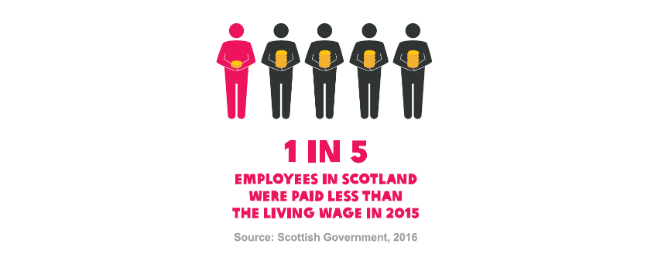This blog first appeared as a guest blog on https://scottishlivingwage.org/
When you ask low-paid workers what matters to them – a decent hourly rate or salary comes top of the list.
That is one of the key findings of research undertaken by Oxfam in partnership with the University of the West of Scotland and Warwick Institute for Employment Research to examine what low-paid workers in Scotland prioritise in order to have ‘decent work’.
Crucially, ‘Decent work for Scotland’s low paid workers: a job to be done‘ wasn’t research on low-paid workers but research with low-paid workers. Through individual interviews, focus groups, street stalls, and an online
opinion poll, more than 1500 people across Scotland gave their views about what ‘decent work’ means to them.
Participants, who were largely recruited from low-paid sectors such as social care, hospitality and cleaning, prioritised 26 factors. Across all the methods used a decent hourly rate or salary was ranked top of the list. Of course beyond wages, other things matter too. Low-paid workers also emphasised the importance of job security; paid leave; a safe working environment; and a supportive line manager.
Participants in the focus groups and interviews emphasised that a decent hourly rate or salary to meet basic needs involved an income that covers food, clothing and housing, but which is also sufficient to participate in society and to ‘save for a rainy day’. Such a description mirrors the Living Wage Foundation’s calculation of a real living wage based on a wage that allows people to participate in society.
Yet while workers prioritise a living wage, 445,000 – a fifth of all employees – were paid less than the real living wage as defined by the Living Wage Foundation in 2015. Two thirds of these workers are women.
Behind these statistics are stories, many of which are detailed in the UWS-Oxfam report, including this one from a female social care worker:
“It’s just not enough, how can I pay all my bills and rents and… buy a bus pass… it’s just not evenings out… It means you can’t participate in basic things… my cousin’s fortieth birthday is coming up… and that’s a real issue for me ’cause I’m thinking ‘How am I gonnae manage this
financially?'”
The above experience is not an isolated one. Another female social care worker described the impact on her social life:
“You just don’t go out… so you’re kinda socially isolated [and] see friends drift off because I’ve never went out with them because I’ve just not had the money”.
Positively, we also heard good news stories. A male worker in the voluntary sector described the impact of a decent wage on his life:
“It allowed me to save up enough money so that I could get the deposit down on my first flat… if one of my friends phoned up and says ‘Do you want tae dae this? Do you want tae do that?’ I could say ‘Aye, we’ll do it'”
The impact on individuals from paying a living wage is clear. There is also evidence to suggest paying a living wage can have a positive impact on businesses themselves: improving staff morale, recruitment and retention, absenteeism, productivity and brand reputation.
Importantly, research from the traditionally low-paid retail sector also emphasises that the benefits of paying a living wage are maximised when combined with wider changes and improvements in conditions – such as removing zero-hour contracts and providing regular and predictable working hours. Positively these are also
the priorities that low-paid workers identified in our research; suggesting moves towards becoming an accredited living wage employer can and should be accompanied by moves to become a decent employer in general.
During Living wage week, we should celebrate the employers who have become accredited while encouraging others to do so. After all, the impact on employees is often life-changing.
